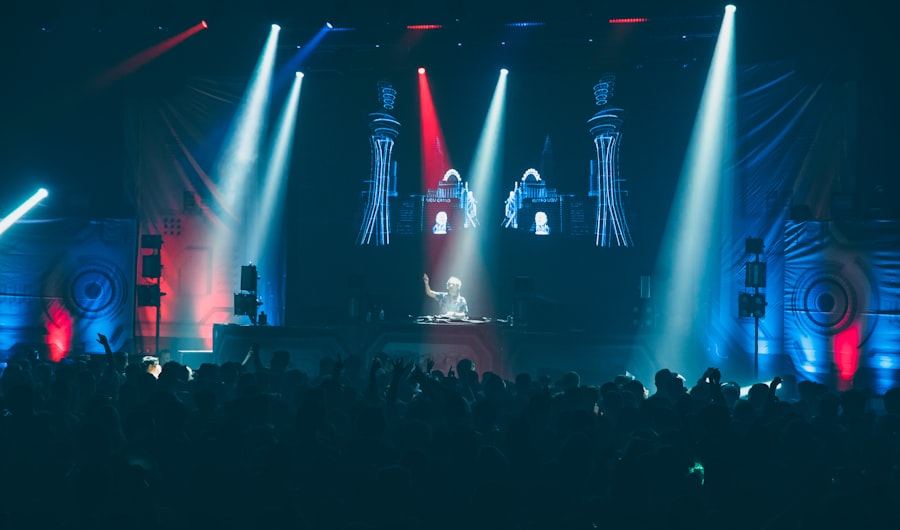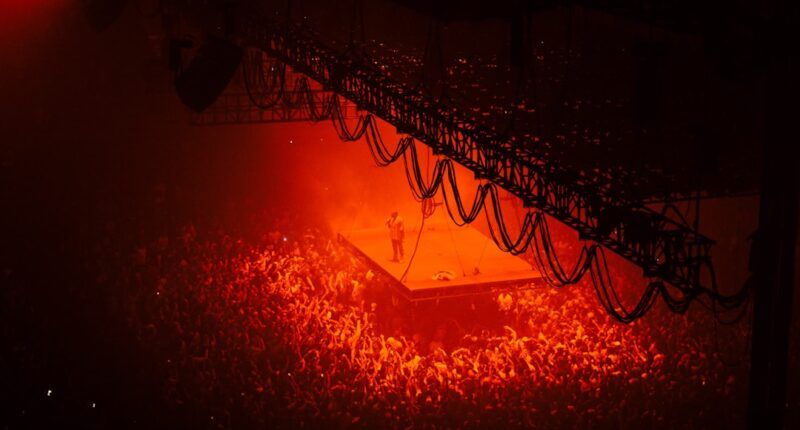Music promoters are integral to the music industry, organizing and promoting live events, concerts, and festivals. Their primary responsibilities include generating excitement for events and artists, drawing large audiences, and ensuring overall event success. They collaborate closely with artists, venues, and record labels to coordinate promotional activities and secure bookings.
Music promoters also negotiate contracts, manage budgets, and oversee event logistics. To excel in this role, promoters must possess a comprehensive understanding of the music industry, strong communication and networking skills, and a genuine passion for music. The career offers both challenges and rewards, providing opportunities to work with talented artists and contribute to the vibrant music scene.
Music promotion is a dynamic and fast-paced field that demands creativity, strategic thinking, and a strong work ethic. Promoters must stay informed about current music and entertainment trends, as well as understand diverse audience preferences. They need to develop innovative promotional campaigns that captivate music fans and stand out in a competitive market.
Skilled negotiation is essential, as promoters often secure deals with venues, sponsors, and other stakeholders. This career is ideal for individuals who are passionate about music and have a natural aptitude for marketing and event planning. Music promoters have the opportunity to work with a wide range of artists and genres, making each project unique and exciting.
The role requires adaptability, as promoters must navigate the ever-changing landscape of the music industry and consumer preferences.
Key Takeaways
- Music promoters play a crucial role in the music industry by organizing and promoting live events and concerts.
- Successful music promoters need to have strong communication, networking, and organizational skills, as well as a passion for music and the ability to work well under pressure.
- While formal education in music promotion is not always required, relevant training and experience in event planning, marketing, and public relations can be beneficial for aspiring music promoters.
- Job opportunities for music promoters can be found in various settings, including music venues, event management companies, and artist management firms, with potential for career growth and advancement.
- Effective music marketing is essential for promoting events and artists, and music promoters can benefit from learning about digital marketing strategies, social media management, and audience engagement techniques.
The Role of Music Promoters in the Music Industry
The Business Side of Music Promotion
Music promoters are also involved in negotiating contracts, managing budgets, and overseeing the logistics of an event. They need to have a deep understanding of the music industry, as well as strong communication and networking skills. Building relationships with key industry players and staying informed about the latest trends and developments in the music scene are essential skills for a music promoter.
Creating Buzz and Attracting Audiences
One of the key responsibilities of music promoters is to create excitement around an event or artist and attract a large audience. They use a variety of marketing and promotional tactics to reach potential concert-goers, such as social media campaigns, email newsletters, press releases, and advertising. Music promoters also work with sponsors and partners to secure funding and support for their events.
Strategic Promotion and Collaboration
Music promoters need to be strategic in their approach, identifying target audiences and tailoring their promotional efforts to appeal to different demographics. They often collaborate with publicists, graphic designers, and other professionals to create compelling promotional materials and maximize the visibility of an event or artist. Overall, music promoters play a crucial role in bringing artists and fans together, contributing to the vibrancy of the music industry.
Skills and Qualities Needed for a Successful Music Promoter

To be successful in the field of music promotion, individuals need to possess a unique set of skills and qualities that will enable them to thrive in this dynamic industry. Strong communication skills are essential for music promoters, as they need to effectively convey their ideas, negotiate deals, and build relationships with artists, managers, venue owners, and other industry professionals. Music promoters also need to be creative and innovative, as they are responsible for developing unique promotional campaigns that will capture the attention of music fans.
They must be able to think outside the box and come up with fresh ideas to promote events and artists. In addition to communication and creativity, music promoters need to have excellent organizational skills and attention to detail. They are responsible for coordinating all aspects of an event, from securing bookings and negotiating contracts to managing budgets and overseeing logistics.
Music promoters must be able to multitask and prioritize effectively to ensure that everything runs smoothly leading up to an event. They also need to be adaptable and able to handle unexpected challenges that may arise during the planning and execution of an event. Furthermore, music promoters should have a strong understanding of marketing principles and be familiar with various promotional channels, such as social media, email marketing, and traditional advertising.
Overall, successful music promoters are passionate about music, dedicated to their work, and possess a diverse skill set that enables them to excel in this competitive industry.
Education and Training for Music Promoters
| Education and Training for Music Promoters |
|---|
| 1. Bachelor’s degree in Music Business or related field |
| 2. Internship or work experience in music industry |
| 3. Knowledge of marketing and promotion strategies |
| 4. Understanding of music industry trends and dynamics |
| 5. Strong communication and networking skills |
While there is no specific educational requirement for becoming a music promoter, having a relevant degree or certification can provide individuals with valuable knowledge and skills that will benefit them in this career. Many music promoters have a background in marketing, business administration, communications, or music industry studies. A degree in one of these fields can provide individuals with a solid foundation in marketing principles, business management, and communication strategies that are essential for success in music promotion.
In addition to formal education, gaining practical experience through internships or entry-level positions in the music industry can be highly beneficial for aspiring music promoters. Working at a record label, talent agency, or concert venue can provide individuals with valuable insights into the inner workings of the music industry and help them build a network of contacts. Many successful music promoters have started their careers by volunteering at local events or working for independent artists or bands.
This hands-on experience can provide individuals with a deeper understanding of the challenges and opportunities in music promotion. Furthermore, there are various professional development opportunities available for individuals interested in pursuing a career in music promotion. There are workshops, seminars, and online courses that focus on topics such as event planning, digital marketing, artist management, and entertainment law.
These resources can help individuals stay informed about industry trends and best practices while expanding their skill set. Overall, while formal education is not a strict requirement for becoming a music promoter, having relevant knowledge and experience can greatly enhance an individual’s prospects in this competitive field.
Job Opportunities and Career Growth in Music Promotion
The field of music promotion offers a wide range of job opportunities for individuals who are passionate about music and have strong marketing skills. Music promoters can work for concert venues, record labels, talent agencies, or as independent contractors. They may specialize in promoting specific genres of music or focus on organizing events for emerging artists or established acts.
Some music promoters may choose to specialize in certain types of events, such as music festivals or corporate concerts. Aspiring music promoters can start their careers by working as assistants or coordinators at talent agencies or event management companies. This can provide them with valuable experience in coordinating events, managing budgets, and liaising with artists and vendors.
As they gain more experience and build a network of contacts in the industry, they may have the opportunity to take on more senior roles with greater responsibilities. Music promotion is a competitive field, but there are ample opportunities for career growth for individuals who are dedicated and ambitious. Successful music promoters may have the opportunity to work on larger-scale events or tours with well-known artists, which can further elevate their profile in the industry.
Some may choose to start their own event management companies or marketing agencies specializing in music promotion. Overall, the field of music promotion offers diverse career paths for individuals who are passionate about music and have a knack for marketing.
The Importance of Music Marketing in Promoting Events and Artists

The Importance of Digital Marketing
Social media has become an essential tool for music promotion due to its ability to reach a large audience quickly and cost-effectively. Music promoters use platforms such as Facebook, Instagram, Twitter, and TikTok to engage with fans, share content about upcoming events or new releases from artists, run contests or giveaways, and create buzz around their projects. Email marketing is another effective way for music promoters to communicate directly with fans who have opted in to receive updates about upcoming events or artist news.
Traditional Advertising Methods
In addition to digital marketing tactics, traditional advertising methods such as print ads, radio spots, or outdoor billboards can still be effective in reaching certain demographics. Music promoters may also collaborate with sponsors or brands to create co-branded campaigns that can help increase exposure for an event or artist while providing additional funding or resources.
Key Elements of Effective Music Marketing
Overall, effective music marketing is essential for promoting events and artists in today’s competitive music industry. It requires creativity, strategic thinking, and a deep understanding of different promotional channels to reach potential concert-goers or fans.
Tips for Getting Started in a Music Promoter Career
For individuals interested in pursuing a career in music promotion, there are several tips that can help them get started on the right path: 1. Gain practical experience: Seek out internships or entry-level positions at record labels, talent agencies, concert venues, or event management companies to gain valuable experience in the industry. 2. Build a network: Attend industry events such as conferences, workshops, or networking mixers to meet professionals in the music industry who can provide guidance or potential job opportunities. 3. Stay informed: Keep up-to-date with the latest trends in music promotion by reading industry publications, following key influencers on social media platforms, or taking relevant courses or workshops. 4. Volunteer at local events: Offer your assistance at local concerts or festivals to gain hands-on experience in event planning and promotion. 5. Develop your skills: Hone your communication skills, marketing knowledge, and organizational abilities through formal education or professional development opportunities. 6. Be proactive: Take initiative by reaching out to artists or venues with creative ideas for potential collaborations or events. 7. Stay persistent: The field of music promotion can be competitive, so it’s important to stay persistent in pursuing your goals and seeking out new opportunities. Overall, pursuing a career in music promotion requires dedication, creativity, and a willingness to learn from practical experience within the industry. By following these tips and staying committed to your goals, you can build a successful career as a music promoter.
If you’re interested in learning more about the world of music promotion, be sure to check out this article on music-influencer.com. This website offers valuable insights and tips for aspiring music promoters, as well as interviews with industry professionals and reviews of the latest music promotion tools. Whether you’re just starting out in the field or looking to take your career to the next level, this article is a must-read for anyone interested in music promotion.
FAQs
What is a music promoter?
A music promoter is responsible for organizing and promoting live music events, such as concerts and music festivals. They work to secure venues, book artists, and market the events to attract an audience.
What are the key responsibilities of a music promoter?
Key responsibilities of a music promoter include booking artists and venues, negotiating contracts, promoting events through advertising and social media, and managing the logistics of the event.
What skills are required to become a successful music promoter?
Successful music promoters typically have strong communication and negotiation skills, a good understanding of the music industry, marketing and promotional skills, and the ability to work well under pressure.
What education or experience is needed to become a music promoter?
There is no specific educational requirement to become a music promoter, but a degree in music business, marketing, or a related field can be beneficial. Experience in event planning, marketing, or the music industry is also valuable.
What is the salary range for music promoters?
The salary range for music promoters can vary widely depending on the size and success of the events they promote. Entry-level promoters may earn around $30,000 to $40,000 per year, while experienced promoters working on larger events can earn significantly more.
What are the challenges of being a music promoter?
Challenges of being a music promoter include dealing with unpredictable factors such as weather, artist cancellations, and ticket sales, as well as the pressure to deliver successful events and manage tight budgets.





